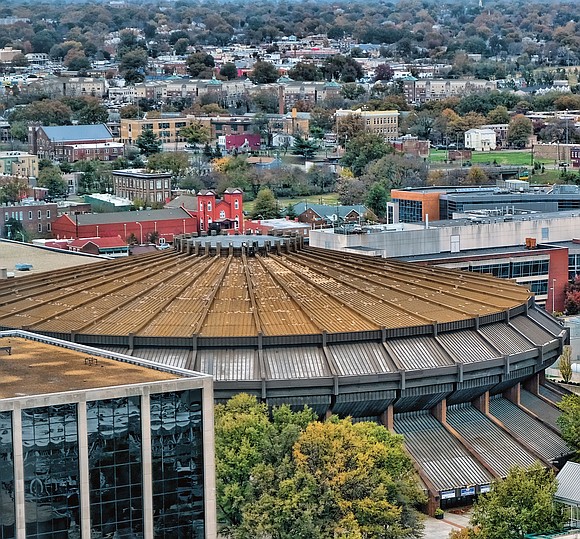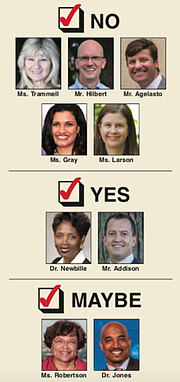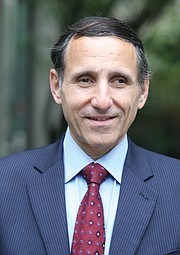Yes, no and maybe: Coliseum vote likely would fail if vote was taken today
Jeremy M. Lazarus | 8/30/2019, 6 a.m.

The Navy Hill District Corp. plan to replace the Richmond Coliseum and bring more than $1 billion in new development nearby has yet to gain the backing of City Council.
Despite a full-court lobbying press and continued op-eds from supporters close to the project published in Richmond’s daily newspaper, which is backing the plan, the project likely would fail if City Council were to vote on it after returning from the summer recess.
As it now stands — and as a citizens’ group continues to battle to get the proposal on the ballot so voters can weigh in — at least four council members, and potentially five, would likely reject the proposal at this time, based on their public statements.
The plan calls for taxpayer funds to build a new 17,500-seat arena, a linchpin of the proposal that the Navy Hill group led by Dominion Energy’s top executive, Thomas F. Farrell II, has presented and that Mayor Levar M. Stoney has embraced.
At least seven council members are needed to support the ordinances that were introduced by the Stoney administration earlier this month because a key element of the plan involves the sale of municipal property, including parcels located north of Broad Street in the area bounded by Marshall, Leigh, 5th and 10th streets and others located to the south in the area bounded by Franklin, Broad, 4th and 7th streets.
The state Constitution requires that three-fourths of the council support any sale of city property.
Whether plan backers can shift members to their side remains to be seen in the coming months.
However, the lack of sufficient support is similar to the problem that former Mayor Dwight C. Jones faced several years ago when he proposed moving the city’s minor league baseball stadium to Shockoe Bottom. Within four weeks of unveiling his plan, it was clear he could not gain the seven votes needed.
At least one member of the council can be listed as a hard no on the Coliseum project, 8th District Councilwoman Reva M. Trammell. She has said people in her district want to their taxes used to improve city services and oppose having the growth in taxes in Downtown earmarked to pay for an arena hosting acts many could not afford to attend.
Others considered likely to oppose the plan if the vote is taken now include Council Vice President Chris A. Hilbert, 3rd District, and outgoing 5th District Councilman Parker C. Agelasto.
While Mr. Hilbert voted at a special Aug. 14 City Council meeting against putting the proposal on the ballot as a non-binding resolution, he also said at the time that he “is very unlikely, at this point, to support this proposal because I just see way too many holes in it out of the gate.”
Mr. Hilbert, who has long experience in reviewing developments as an underwriter and senior community housing officer with the Virginia Housing Development Authority, told the audience he is skeptical of the projections for tax generation associated with the project.
That includes the projected level of lodging taxes to be generated by the large convention hotel that is to be part of the development, as well as the attendance projections for the new arena that he said “would be more than Washington and Baltimore combined.”
Such items, as well as the prospect of an impending recession, “give me great pause” about the project,” Mr. Hilbert said, noting that he views the project’s claims as akin to “many of the things I was told and promised (on past projects I supported) that did not materialize.”
In sum, he said, “One of the best decisions you can make in life is to say no.” Mr. Agelasto, who abstained in the vote to put the issue on the ballot, did so because he said he believes the proposal is not ready at this point and should not go to the public until there is substantial
improvement.
Another council member who likely would oppose it at this point is 2nd District Councilwoman Kim B. Gray, considered a potential mayoral candidate next year. While she supported putting the proposal on the ballot, she also led the charge to set up an advisory group to review the proposal and would want to see the results. Those might not be in until December.
A potential fifth opponent might be 4th District Councilwoman Kristen N. Larson, who also supported an advisory referendum. She, too, wants more information.
Observers list only two members as a likely hard yes on the Coliseum plan, Council President Cynthia I. Newbille, 7th District, and 1st District Councilman Andreas D. Addison.
While neither has yet taken a public stand and have said they are studying the matter, the two other members, 6th District Councilwoman Ellen F. Robertson and 9th District Councilman Michael J. Jones, tentatively have been put in the yes camp.
Ms. Robertson was moved to a likely yes after Mayor Stoney nixed a plan to move the Richmond Department of Social Services headquarters from Downtown to South Side, near the city’s boundary with Chesterfield County. The mayor pledged to keep the operation in Downtown.
Ms. Robertson had made it clear she would oppose the project if the building was moved to the distant location to clear more land for the Navy Hill development.
Dr. Jones has objected to being put in the yes camp at this point, saying it is too early to be put in either camp. He said that he is still studying the proposal, gathering information and listening to district residents.
On the referendum front, Paul Goldman, leader of the Put Schools First campaign, filed a motion Tuesday in Richmond Circuit Court asking the court to compel city Voter Registrar Kirk Showalter to begin counting voter signatures he argues were wrongly disqualified and to bar her from completing the Richmond ballot while she reviews those signatures.
Mr. Goldman told the court that he and volunteers have found 1,000 signatures of registered voters that he believes Ms. Showalter and her staff wrongly threw out in coming to the conclusion that he had submitted only 9,941 valid signatures on petitions, or 400 short of the 10,341 needed to put the Coliseum replacement plan on the Nov. 5 ballot.








